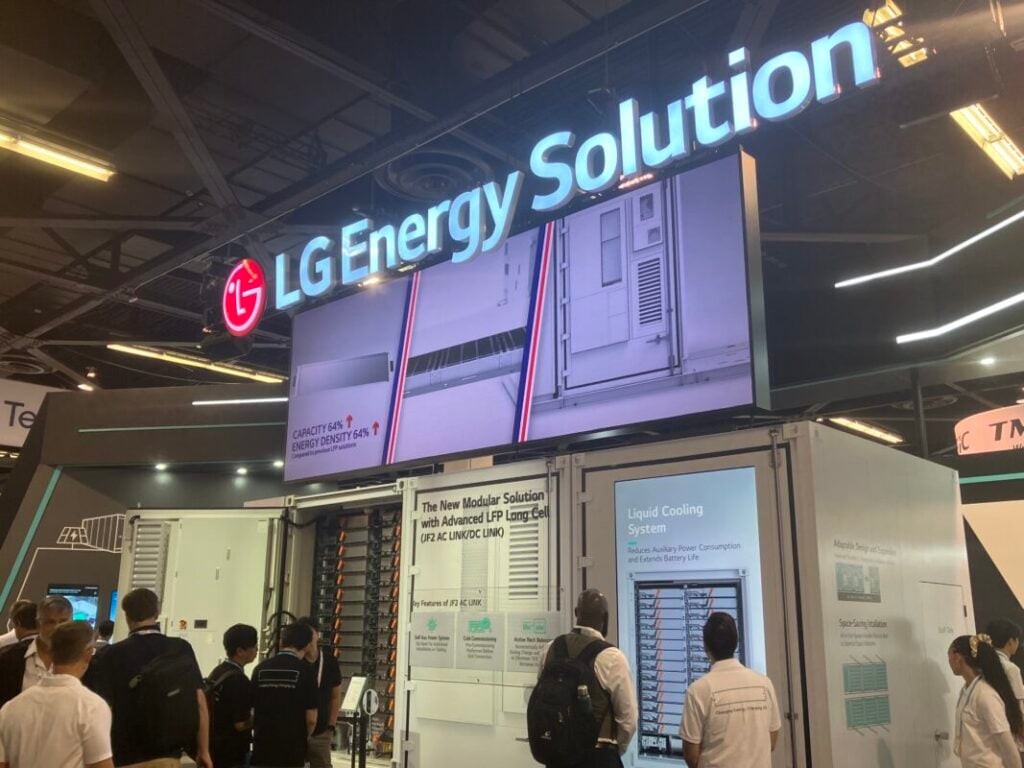
LG Energy Solution (LG ES) will begin production of lithium iron phosphate (LFP) cells for stationary energy storage applications in the US this year.
Battery manufacturer LG ES disclosed to the Korea Stock Exchange last Wednesday (18 February) that the company board had decided to provide a debt guarantee to its affiliate LG Energy Storage Michigan.
Enjoy 12 months of exclusive analysis
- Regular insight and analysis of the industry’s biggest developments
- In-depth interviews with the industry’s leading figures
- Annual digital subscription to the PV Tech Power journal
- Discounts on Solar Media’s portfolio of events, in-person and virtual
The subsidiary operates one of LG ES’s existing production plants in Holland, Michigan, US. The factory, currently fitted out with production lines for electric vehicle (EV) battery cells, will be retooled to accommodate mass production of energy storage system (ESS) cells.
As has previously been reported by Energy-Storage.news, the manufacturer has long identified North America as a key market for its ESS business, including the establishment of a grid-scale battery storage system integrator arm, LG ES Vertech.
“Through this debt guarantee, LG Energy Solution Michigan, Inc. plans to procure a loan and use the loan as an investment resource to respond to the demand for ESS (Energy Storage System) in North America,” the firm said in its disclosure.
LG ES is listed on the Korea Stock Exchange’s KOSPI index. The board approved a debt guarantee for a total KRW2 trillion (US$1.4 billion), including US$681 million previously announced in November 2021 and US$729 million additional investment just confirmed.
While the stock exchange announcement did not go into the specifics of the manufacturing strategy, a company spokesperson confirmed that it will involve the production of LFP cells at the plant. The spokesperson also confirmed that, as per a previously announced timeline, mass production will begin during 2025.
Emphasis on US domestic manufacturing, ‘trade-off’ between EV and ESS demand
In announcing its annual financial results for 2024 in late January, the company had said a slowdown in the European EV market had impacted its revenues along with declines in average selling price (ASP).
The company said this slowdown was in contrast to an uptick in demand from the battery energy storage system (BESS) market in North America, while it is also seeking to establish a first-mover advantage in domestic battery manufacturing in the US.
CFO Chang-Sil Lee said in announcing results that the company is also closely monitoring potential changes to policies supporting EV supply- and demand-side measures in the US since Donald Trump took office. Trump has already rolled back public spending on EV infrastructure.
With higher tariffs on battery products imported from China, which were already announced in May last year under Joe Biden and set to go into effect in 2026, Trump has also announced a blanket 10% extra tariff on all Chinese goods imported to the US.
This puts extra emphasis on a US domestic manufacturing plan LG ES had already announced, although the company originally intended to open a new manufacturing plant in Arizona with a 16GWh annual production capacity for ESS cells.
The Arizona plant was later put on ‘pause’ however and LG ES head of ESS Hyung-Sik Kim and LG ES Vertech CEO Jaehong Park told ESN Premium in an exclusive interview last year that this was part of an overall strategy to shift capacity between EV and ESS products based on market demand.
Tesla CEO Elon Musk recently also said his company would consider production capacity trade-offs as it also saw demand for ESS rising, while EV growth is slower than many had anticipated.
That said, on the same day as the Michigan ESS cell investment was announced, LG ES said in a separate disclosure to KOSPI that it would provide a US$2.5 billion debt guarantee to LG ES Michigan to buy Ultium Cells’s EV cell manufacturing plant in the US state.
Ultium is LG ES’s joint venture with auto manufacturer General Motors (GM). GM decided last year to sell its stake in the Michigan plant, which is one of three Ultium has in addition to facilities in Tennessee and Ohio. Reuters reported last week that Japanese carmaker Toyota agreed to transfer an order to LG ES to production from the Michigan factory.






